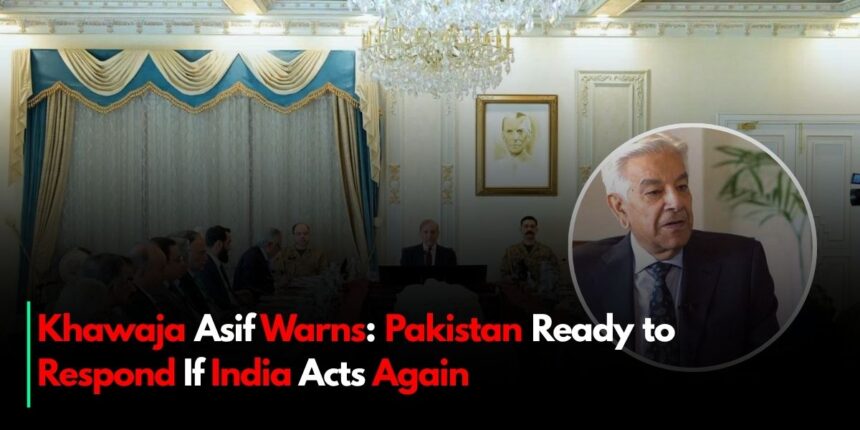Khawaja Asif, Pakistan’s Defence Minister, sent India a clear warning, indicating plainly that Islamabad is still able to counter provocations going forward. Given the further heightening of tensions after the capture of an alleged Indian national in Balochistan and New Delhi’s latest activity related to the Indus Waters Treaty, now is a delicate time.
Clear Message: No Intention to Initiate, But Ready to Defend
Speaking in a recent television interview, Asif emphasized that Pakistan won’t initiate hostilities against India, but will not hesitate to act if provoked. “We have been saying for weeks that we will not start anything hostile,” he told Geo News. “But if attacked, we will respond—and respond decisively.”
His point was echoed again in comments to Bloomberg Television, where he noted that tensions can be “wrapped up” if India retreats from aggressive posturing.
Deterrence Through History and Treaties
Asif didn’t limit his warning to words alone. He referenced past incidents—most notably the shooting-down of Wing Commander Abhinandan in 2019—which he pointed to as proof that Pakistan knows how to defend its airspace.
On water, he reiterated that India cannot unilaterally suspend the Indus Waters Treaty. “As per the treaty, India is not in a position to make such a decision alone,” he stressed. If New Delhi tries, Pakistan stands ready to respond.
Tensions Over Arrested Operative and Terror Links
Asif also revealed on Aaj TV that Pakistan had recently detained another alleged Indian operative near the Iran-Afghanistan border—a move some say echoes the Kulbhushan Jadhav abduction case english.aaj.tv. He reiterated Islamabad’s belief that Jaipur continues to back separatist and militant groups in Balochistan and Pakistan-administered Kashmir via Afghan channels.
“If India takes extreme steps under internal pressure, we are prepared,” he warned .
The Nuclear Cue: ‘Clear and Present Danger’
Asif’s tone sharpened farther when he referred to the nuclear dimension. After last month’s Indian air strikes in PoK, he warned that India’s escalation risked a full-blown nuclear war—placing responsibility squarely on New Delhi.
His remarks underlined Pakistan’s doctrine: nuclear weapons serve as deterrence, not tools of first strike. But cross-border attacks could force Islamabad’s hand in defense .
What It Means for Islamabad and New Delhi
Khawaja Asif’s comments reflect a deliberate strategy. On the one hand, Islamabad positions itself as a responsible state, reluctant to initiate conflict. On the other, it claims a heavy readiness to repel any external aggression, particularly if backed by hostile civilian or geopolitical moves.
By invoking past retaliations, treaties, and nuclear safeguards, Asif aims to show Pakistan is not only vigilant but also disciplined and legally sound. It’s a message pitched at both Indian audiences and global allies—especially China, the Gulf, and Western powers.
Looking Ahead
For Pakistan, two themes emerge: strategic restraint and military preparedness. Asif’s repeated assurances suggest that, unless India de-escalates—formally or informally—Pakistan will hold its line with whatever means necessary, including cyber or legal steps, as hinted in past remarks .
This posture also leaves room for diplomacy. Multiple statements by Islamabad refer to continuing UN protocols, back-channel talks, and even UN Charter rights, indicating Pakistan hopes India pulls back before reserves are tested .
In summary, Khawaja Asif’s message is sharpened but measured: Pakistan does not seek conflict—but it is neither naïve nor complacent. If India escalates again, Pakistan’s response will be swift, disciplined, and potentially unexpected. Whether this posture leads to calm or crisis depends on how both nuclear neighbours choose to navigate the current volatility.








